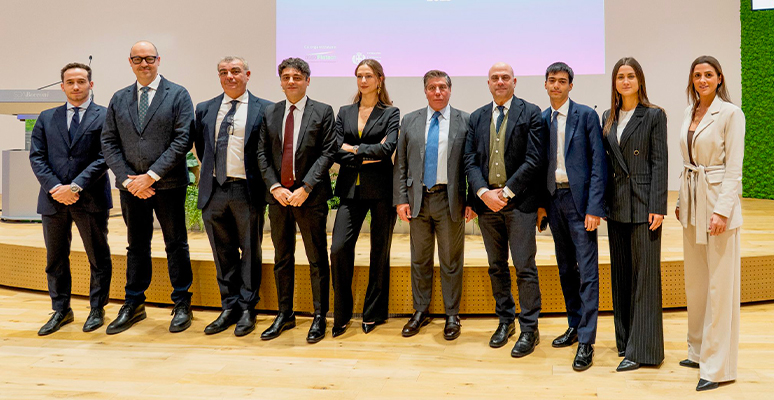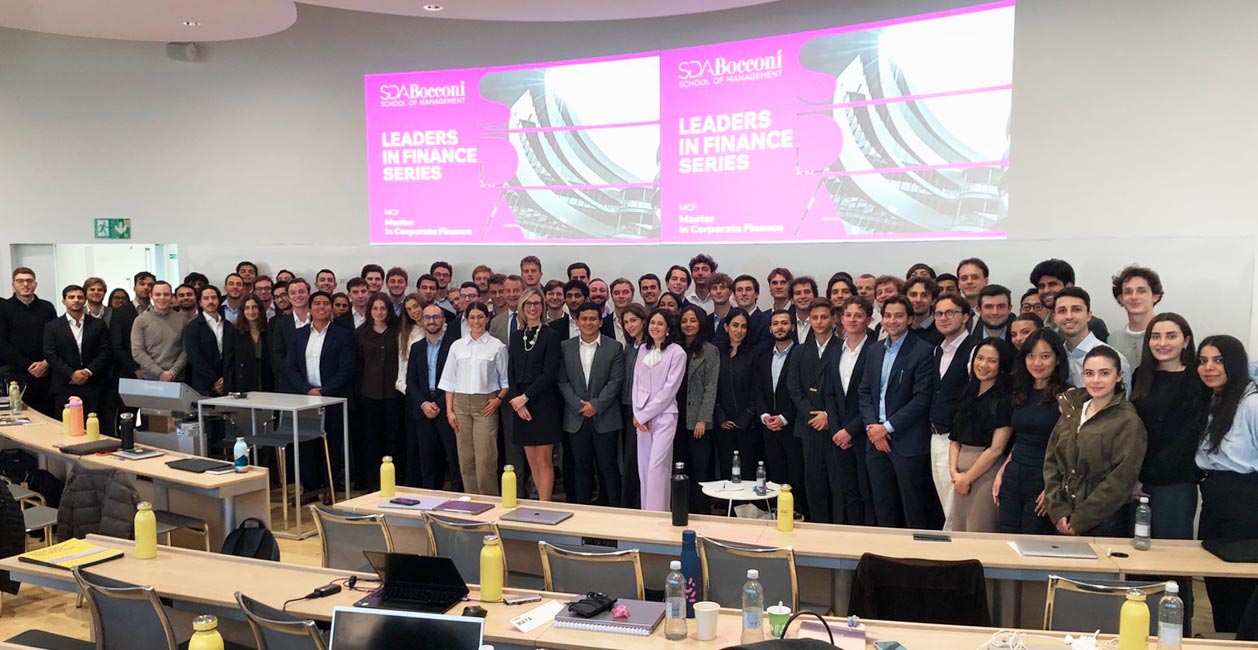
- Start date
- Duration
- Format
- Language
- 3 Dec 2025
- 3 Days
- Class
- Italian
Acquisire competenze su finanziamenti, business plan e valutazione avanzata delle startup per concepire, lanciare e far crescere nuove imprese.
On April 11, 2025, the SDA Bocconi School of Management hosted the second edition of Banking Day. The event took place at a particularly dynamic time in global markets.
Professor Federico Pippo, Director of the Master in Corporate Finance, officially opened the event, setting the stage for an immersive experience of high-level discussion, debate, and networking focused on the present and future of banking . With four panels featuring seasoned professionals from leading institutions, the event explored the intersection of market forces, technology, regulation, and innovation in the financial sector.
Panelists:
The first panel addressed how investment banks are navigating persistent geopolitical uncertainty and rapid technological evolution. The discussion began with the acknowledgement that volatility, once seen as disruptive, is now the new normal. This demands a higher threshold for dealmaking and increased agility in adapting to market shifts.
The panelists highlighted the growing complexity of cross-border transactions, the critical importance of geopolitical awareness, and the notable influx of U.S. capital into undervalued European sectors. While AI was recognized as a tool for increasing efficiency, the consensus was that human judgment remains essential, especially in high-stakes environments.
Sustainability also took center stage, as speakers described how ESG considerations are now fully embedded into credit analysis and long-term strategy. The message for aspiring professionals was clear: adaptability, trust, and a solid grounding in fundamentals will define success in this evolving landscape.
Panelists:
The second panel took a deep dive into how capital markets are adjusting to new financial and regulatory realities, especially the impact of rising interest rates and the growing role of ESG in investment decisions. The conversation began with a discussion of how monetary policy shifts have influenced capital raising activities, with higher rates slowing down M&A activity and making acquisition financing more complex, particularly for small and mid-sized enterprises.
From the equity side, Antonio Carbone explained how rising rates have reshaped investor focus, placing pressure on valuations and tightening competition for capital. Anna Marucci described how retail investors have increasingly turned to fixed income instruments, like secondary market retail bonds, while issuers approach the market with more caution and strategic planning.
Paola Pellegrini offered a private equity perspective, noting that companies are now prioritizing debt refinancing and delaying new investments as they adapt to less favorable financing conditions. She also highlighted the transformation of private debt markets, which now offer more tailored, flexible solutions compared to traditional LBO structures.
The discussion turned to hybrid products and the innovation happening within ESG-linked instruments. Federico Bonaccorsi discussed the popularity and volatility of ESG-labelled hybrids, and how recent rate environments have impacted their performance. Marco Spano added that hybrid spreads widened significantly during key geopolitical events but have since begun to compress, highlighting both market sensitivity and resilience.
ESG was another central theme. The panelists explored the shifting narrative around sustainable finance - from one driven by compliance and regulation to one rooted in long-term value creation, governance, and resilience. Differences between EU and U.S. approaches were debated, with the EU seen as more ambitious, while the U.S. is taking a more pragmatic stance.
The conversation also covered how banks are being pushed to include more green assets on their balance sheets, and how this is influencing product development and investor expectations. ESG is no longer just a checkbox, it is becoming a core part of IPO preparation, due diligence, and investor communication.
The panel concluded with reflections on digitalization and AI. Anna Marucci acknowledged the environmental footprint of growing digital infrastructure but emphasized that innovation and sustainability can go hand in hand, especially with increasing investments in green technology to power data centers and financial platforms.
Panelists:
As the largest generational wealth transfer in history unfolds, the Wealth Management industry is undergoing profound changes. The third panel explored how firms are adapting to serve younger, tech-savvy clients without compromising the trust and personal connection that define traditional advisory services.
Speakers emphasized the growing relevance of private market investments and the rising demand for personalized, values-driven financial solutions. While AI is streamlining service delivery, the panel underscored that it will not replace human advisors. Instead, AI will empower them, enabling better insights, responsiveness, and scalability.
The key to success in the next era of Wealth Management, panelists agreed, lies in the ability to forge deep relationships across generations. The future will belong to professionals who not only understand financial markets but also genuinely enjoy building long-term client connections.
Panelists:
The final panel tackled one of the most exciting frontiers in finance: fintech. Industry leaders shared how they are leveraging technology to rethink everything from credit underwriting to client onboarding, offering a stark contrast to the often slow-moving processes of traditional banks.
Nicastro explained how fintech can offer same-day credit decisions thanks to automation and access to market data, contrasted with the three-month timelines of legacy systems. Tana discussed the unseen risks of new technologies, emphasizing the importance of resilience and proactive risk management.
Vecchi shared how Banca Investis scaled its services by digitizing the work of junior bankers through an AI-powered platform, drastically lowering the entry barrier for clients and expanding access to personalized advice.
Across the board, panelists agreed that fintech is not just digitizing banking, it’s redefining it. Yet, trust remains a non-negotiable pillar. Ultimately, the combination of technological speed, data-driven insight, and human credibility will shape the next generation of financial institutions.
Banking Day 2025 was more than just a series of discussions, it was an experience that reflected the pulse of the industry today. Through thought-provoking panels and interactive exchanges, participants explored the major forces redefining banking and finance, from monetary tightening to AI, from ESG evolution to client expectations in a digital-first world.
For students and early-career professionals, the event offered a unique learning opportunity: direct access to top industry voices, unfiltered insights into current market dynamics, and inspiration for their own future paths. The panels not only clarified how financial institutions are navigating disruption, but also shed light on the kind of professionals the industry will need in the coming years; curious, resilient, and able to connect across disciplines and generations.
Perhaps most importantly, the event reinforced SDA Bocconi’s role as a meeting point between academia and the financial world. Banking Day has firmly established itself as a key platform for dialogue, mentorship, and the continued development of a vibrant, forward-thinking finance community at SDA Bocconi.

Acquisire competenze su finanziamenti, business plan e valutazione avanzata delle startup per concepire, lanciare e far crescere nuove imprese.

Il corso intende fornire tutte le competenze necessarie a padroneggiare e applicare i principali strumenti e framework esistenti in materia di sustainability reporting.

Comprendere e gestire le variabili rilevanti negli investimenti immobiliari come convenienza economica e strutturazione del finanziamento bancario dei progetti.

